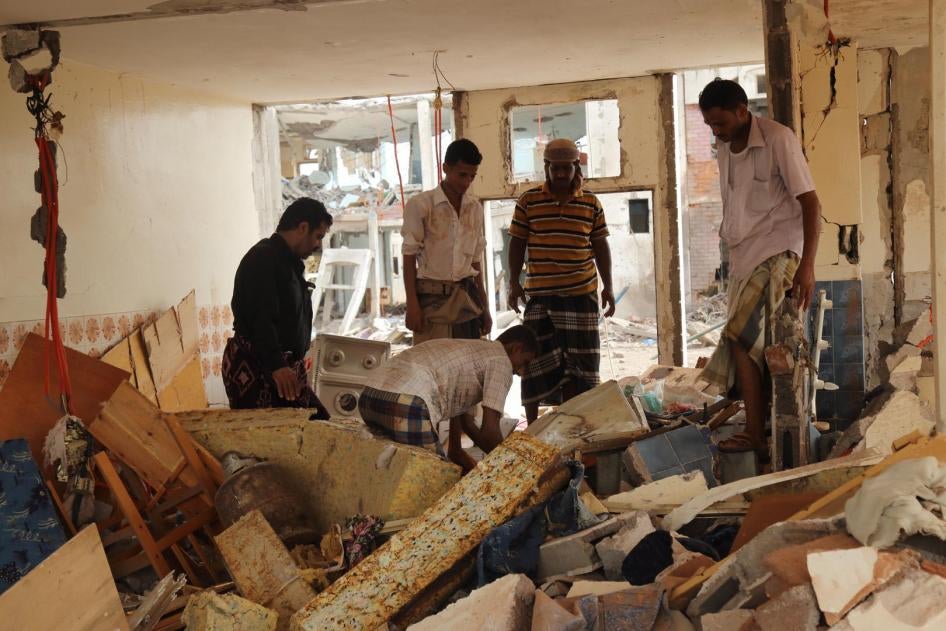One night in July, as they slept in their home in central Yemen, Sabah and her family were awakened by loud explosions nearby. Terrified, Sabah took her family outside, including her daughter, who had just given birth. "All of a sudden the windows in our house shattered and the roof collapsed," she told me as we sat among the ruins of her house a few days after the airstrike. When the dust settled, Sabah discovered that six houses had been destroyed and 16 people were dead, including her two brothers and their children.
Sabah's family got caught up in the war that has been raging in Yemen since last year. The Houthis, a group from northern Yemen, seized control of the capital, Sanaa, in September, effectively ousting the government of President Abdu Rabu Mansour Hadi, who fled to Saudi Arabia. Since March, Saudi Arabia and a coalition of eight other countries have tried to push back the Houthis, including by a massive air campaign. Other countries, notably the U.S. and the U.K., have been providing support for the effort.
On that July night, coalition aircraft were targeting a Houthi military base on the outskirts of Yarim, but one bomb missed, hitting Sabah's neighbourhood instead.
The war, and particularly the numerous coalition airstrikes, has taken a terrible toll on civilians. As of late September, the U.N. had documented that the war had killed 2,355 civilians and wounded 4,862, the majority in coalition airstrikes. In the nearly two dozen strikes that we have investigated on the ground, we collected the names of more than 300 civilians who died, many of them children.
And the civilian deaths continue. In the last few weeks local authorities and activists in Yemen have reported that coalition aircraft bombed two wedding parties, killing dozens of civilians. While a proper investigation is needed to establish the facts, our research shows that many coalition airstrikes that have killed civilians violated the laws of war.
One of the main reasons for the high number of civilian casualties in Yemen is that the warring parties are using explosive weapons with wide-area effect in populated areas—in other words, they are using powerful bombs and rockets in towns and cities. This does not only apply to the Saudi-led coalition. We have also documented that artillery rockets and shells fired by Houthi forces have killed and wounded civilians, though in far fewer numbers.
Some of the deadliest incidents we have documented occurred when bombs hit large gatherings of civilians, for example in marketplaces, or in the reported recent attacks on weddings. For many of these attacks we simply don't know what the target was. Did the coalition believe that the large gatherings were Houthi forces or did they carry out attacks on valid military targets using weapons or methods of attack that caused large civilian loss of life?
Under the laws of war, civilians and civilian objects may never be deliberate targets of attack. Saudi Arabia has denied that the coalition is targeting civilians. Nonetheless, the high civilian casualties in a number of attacks indicates that the coalition is not taking the necessary precautions to minimize civilian casualties, or that it is carrying out attacks that fail to distinguish between fighters and civilians in violation of the laws of war.
Saudi Arabia and its coalition partners have shown no sign that it is investigating these alleged unlawful attacks, as the laws of war require. Instead, coalition spokespeople have sometimes implausibly denied responsibility for the attacks. And Saudi Arabia blocked an effort to create an international inquiry into the conduct of all warring parties at the U.N. Human Rights Council in Geneva in September, and the final resolution that passed instead made reference to a national inquiry led by the Yemeni government in exile.
Public criticism of the high civilian death toll in Yemen is increasing, however U.N. Secretary-General Ban Ki-moon has called for an end to the bombing, and a U.S. Senate Committee is holding up arms sales to Saudi because of the air campaign in Yemen has led to concerns about the high number of civilian casualties. Governments that are supporting the Saudi coalition should join in this public criticism and use their leverage to change the way the Saudi-led coalition conducts the war.








